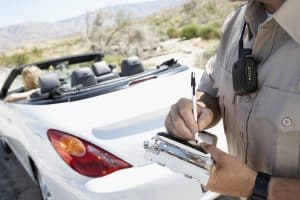
Traffic tickets are frequently issued at the scene of a car accident. In most cases, the police officer who issued the ticket(s) was not an actual witness to the alleged offense but was rather called to the scene by 911 which may possibly be used as a defense (see below).
Some commonly issued traffic tickets in New Jersey that result from an auto accident are:
- Careless Driving N.J.S.A. 39:4-97
- Cell Phone Use N.J.S.A. 39:4-97.3
- Driving While Intoxicated N.J.S.A. 39:4-50
- Failure to Signal Lane Change N.J.S.A. 39:4-126
- Failure to Yield N.J.S.A. 39:4-90
- Failure to Yield to a Pedestrian N.J.S.A. 39:4-36
- Following Too Closely (Tailgating) N.J.S.A. 39:4-89
- Leaving the Scene of an Accident N.J.S.A. 39:4-129
- Moved from Lane Unsafely N.J.S.A. 39:4-88B
- Reckless Driving N.J.S.A. 39:4-96
- Speed Not Reasonable and Prudent N.J.S.A. 39:4-98
- Speeding N.J.S.A. 39:4-98
- Unsafe Driving N.J.S.A. 39:4-97.2
Note, however, that if there is a third party witness (an observer who was not involved), or the driver makes an admission of guilt, that may be the basis for a conviction. In these instances, an attorney should be consulted to discuss the implications.
Defenses for Tickets Resulting from Unwitnessed Auto Accidents
Here’s a common scenario: A driver takes a hard turn and ends up smacking into a guard rail. The police are called and arrive at the scene and conclude based on the fact that the driver got into an accident that they moved from the lane unsafely and this was the cause of the accident, or that they took the turn at an unsafe rate of speed and issued a ticket for violation of N.J.S.A. 39:4-88, N.J.S.A. 39:4-96, or both. In New Jersey, the most common is the “catch-all” known as careless driving. However, the courts have ruled that the very fact that an accident occurred does not prove that the defendant was guilty of a criminal or traffic offense. According to State v. Nyangweso, "the mere fact that a collision occurred does not establish beyond a reasonable doubt that the defendant was inattentive or driving carelessly." On the other hand, if other drivers and/or pedestrians go on the record as witnesses, or the defendant makes an admission of guilt, the prosecution may have enough to prove their case.
The Risks Involved in Pleading Guilty to Traffic Tickets the Result from Auto Accidents
When an accident is associated with a traffic ticket, it is imperative that the case is handled carefully. Pleading guilty to a traffic ticket can be used in a personal injury lawsuit in New Jersey as evidence that the driver was at fault in an accident and liable for any injuries or other damages. Even if the ticket is reduced via a plea bargain, the conviction could still potentially be used against the driver. Thankfully, New Jersey allows drivers the option to plead guilty with a civil reservation. By requesting a civil reservation, a driver is able to prevent a traffic conviction from being used in a related civil lawsuit, including a personal injury suit stemming from an auto accident. Regardless, be sure to consult with an attorney before deciding how to proceed.
How Long is Too Long to Wait Before Filing an Auto Accident Personal Injury Claim?
New Jersey’s car accident statute of limitations is two years. That means a person who is in an auto accident has two years from the date of the crash to file a lawsuit or personal injury insurance claim. This is reasonable as many times certain kinds of injuries, including those to the neck and back, do not become apparent until days, weeks, or even months later. In addition, a person who is seriously injured may not be well enough to go through deposition and/or appear at a hearing until some time after the accident.
How Do NJ Insurance Companies Determine How Much to Award a Driver?
New Jersey uses what is called a “modified comparative fault” model to determine how much is awarded in auto accidents. First, the insurance company uses the police report and any other evidence and information it can gather related to the accident (including which traffic offenses are driver may be charged with) to determine how much each is at fault. For example, it may decide that one driver is 25% at fault and the other is 75% at fault. Suppose the former driver (25% at fault) has about $100,000 in medical and vehicle repair bills not covered by insurance as a result of the accident, which a judge and jury rules he/she is entitled to. In that case, he/she will receive $75,000 (reduce the total by 25% in accordance with his/her level of fault). Any driver found to be more than 50% at fault for a crash will not receive any compensation through a personal injury lawsuit.
What if No Ticket Issued to Either Party?
If neither driver is issued a traffic ticket in the case of an accident, the insurance companies will still use the modified comparative fault model based on the police report and other information to determine which driver is at fault and how much so. Traffic tickets are only one piece of information that insurance companies use.
I Was Injured but Got a Ticket: Can I Sue?
Theoretically, a person who was issued a traffic ticket in connection with an auto accident can still sue. This is true regardless of whether or not the other driver was also ticketed. However, it is highly advised that one first attempt to beat the charge. The traffic conviction will otherwise make it difficult to win a large enough award to cover necessary costs and can affect how much fault assigned to the plaintiff.
Case Law on NJ Traffic Tickets and Auto Accidents
New Jersey holds that the violation of one or more traffic laws, while not negligence per se, can be used as evidence by a jury in determining issues of negligence or contributory negligence. (Mattero v. Silverman, 71 N.J. Super. 1, 9). This was used by the New Jersey Supreme Court to uphold a ruling of negligence in Horbal v. McNeil 328 A. 2d 604, 66 NJ 99. The plaintiff’s decedent was struck by another vehicle entering an intersection. The defendant's vehicle was determined to be speeding (30 mph in a 25 mph zone). In addition, the defendant violated N.J.S.A. 39:4-90, which gave right-of-way to the plaintiff’s vehicle. As such, the NJ Supreme Court upheld the trial jury’s decision to use either traffic violation as evidence of negligence.
In Giantonnio v. Taccard, 676 A. 2d 1110, NJ Appellate Court reversed a lower court ruling clearing the defendant of negligence. The lower court had ruled that the plaintiff, who ran a red light while following a funeral procession in an unfamiliar neighborhood, was fully at fault for a resulting accident with the defendant’s vehicle. However, the Appellate Court reversed this and sent the matter back to the Law Division for a new trial. It had determined that the defendant had failed to exercise due care when entering the intersection (as a vehicle in the next lane had done) and thus may have bored some responsibility.
Who Should I Contact for Help with an Accident-Related Traffic Ticket?
It is essential that you retain an attorney if you or someone you love has been ticketed for an offense related to a traffic accident in New York or New Jersey. The lawyers at Rosenblum Law are skilled defense and traffic ticket attorneys who can help you mitigate or avoid the worst consequences. Email Rosenblum Law or call 888-883-5529 today for a free consultation about your case.


